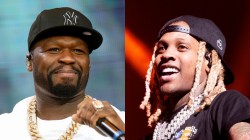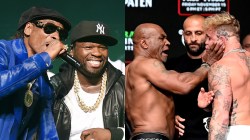Years down the line, pop culture will probably view 2015 as the year race tensions within the United States boiled over in ways previously unseen. From the upcoming elections to weekly footage released of black men and women getting murdered by the police, it’s literally unavoidable. The response? Embracing blackness even more. Take a look at television. Empire and Blackish rule prime time Wednesday nights. Even as this is written, a large portion of the TV watching public are viewing the live broadcast of The Wiz. By the time this interview drops, Spike Lee’s controversial film Chi-Raq is becoming the most talked about film this weekend. On both positive and negative levels, blackness is being defined in a variety of ways. Of course, Hip Hop isn’t any different. The blackest album this year also so happens to be critically the best let Kendrick Lamar tell it. Ask Pittsburgh’s own Jasiri X about it and he’ll delightfully inform one how much deeper things have become past the music. And, he should know.
X’s breakout moment happened on the heels of social media’s first neo-civil rights movement known as The Jena 6. Sometime later, he’s creating fairly slick videos of him rhyming news stories on top of popular instrumentals. Not bad for someone who utilized the power of Hip Hop to improve his community through the 1Hood organization. As an artists, one off singles and projects have lead to what could be considered his best project to date. Inspired by modern times, Black Liberation Theology is the full Jasiri X experience in intensive lyricism and thought provoking themes. Helps that this time around, he gets some significant guest verses from the likes of David Banner and Rhymefest among others.
Speaking with DX, Jasiri X talks Black Liberation Theology, how The Jena Six kick started his rap career and a joint album with Rhymefest.
Jasiri X Says New Notions Of Blackness Inspired “Black Liberation Theology”
https://youtu.be/hNEcDR-zs8M

AD LOADING...
DX: Congratulations on dropping your project.
Jasiri X: It’s funny man. The response to the album has been so dope that I’m really happy. I always felt it was good, but I’m really overwhelmed by the response.
DX: Where did you get the concept for naming the album Black Liberation Theology?
Jasiri X: It kind of came from the fact that we’re really embracing blackness in a way that I hadn’t seen in my life. I grew up in the era where we called ourselves African American where we questioned what are we. We’re in a moment where people are really affirming their blackness and being proud to be black unapologetically. I thought that was really cool. I also wanted to make an album that was an homage to albums in the 90s which was the era that really influenced me. More specifically, the albums in the early 90s that used clips of speakers and stuff. I gained social consciousness through Hip Hop. It started with me listening to Nas and Wu-Tang before going back to Public Enemy, KRS-One, and X-Clan. These are the artists that got me thinking about myself in a real way. It was a point where I was doing other things and Hip Hop brought me back. I wanted to pay tribute to them. I thought Black Liberation Theology was a dope title because we’re out here fighting for our liberation. What’s the belief system when it comes to black liberation. I tried to cover my bases in terms of my theologies. I had to do a dedication to the women because everywhere I go around the country, black women are leading the movement and putting their lives on the line for black men and children.

AD LOADING...
DX: Seems like you’re referring to the “Black Girl Rock” track. You have some really cool features including one with David Banner who has always been known for being socially conscious, but has amped things up significantly. Last time I spoke with him, he talked about making amends with black women.
Jasiri X: Oh yeah, funny because I remember particularly coming up and watching the video for “Play.” I was like damn, let me watch this like five more times. [Laughter] He was in the video with all those fine women. I do this thing called Rap Sessions which was founded by a brother named Bakari Kitwana and he wrote a book called The Hip-Hop Generation. He really introduces Hip Hop to academia in a very real way. These conversations revolved around Hip Hop and Politics. We were doing a panel at Jackson State University in Mississippi and Banner in on the panel. He was such a real dude and we kicked it afterward. He was like take my number. I responded that I already had his assistant’s number, but he wanted me to have his. I had my 1Hood organization and we brought him to speak in Pittsburgh. He did such a powerful job talking about going to Europe and watching how Hip Hop was being portrayed. He felt as if he contributed to the negative portrayal; black men in particular. One of the questions he asked was if he had a song to play for God, what would it be. To see him now, he’s really like my big brother. We don’t really talk about music. We build about everything else because he’s like family to me. I happened to be in Atlanta and he came and got me. I wanted him to be on my project so I started playing him some beats and the one for “Black Liberation Theology Pt.1” came up. Hip Hop is in a place where people can’t be old. People want to throw you out. I appreciate how Banner is carrying himself as an elder statesman of Hip Hop and being proud of it. And, he’s making good music. I got to hear a preliminary version of The God Box and it’s an incredible sounding project. The beats are amazing, but the content is much more powerful. He’s speaking a real clear unadulterated truth. When people hear it, it’s going to shake up folks in a good way.
Jasiri X Talks Joint Project With Rhymefest
DX: Then you have the “ChristIs” joint with Rhymefest which is a clear album standout.

AD LOADING...
Jasiri X: Once again, Rhymefest is my brother. Rhymefest was the first established artist in Hip Hop who reached out to me. I don’t know how many years ago but I had given him a DVD. He said he was about to throw it away and his someone told him to play it. It had my videos and he called me. Since then, we’ve been good friends. I was supposed to drop Black Liberation Theology in the summer time. I went to Chicago, let him hear it and played it for him. He had critiques on some of the songs. It was up to me to listen to him as he does have an Oscar and Grammy. I was going to listen so I went back and reworked it. Part of the reason it’s much better is because of the critique he gave me. He sent me the track and said he wanted to go back and forth with me about if Jesus came back. We actually did a whole album together that’s coming out next year. It’s going to be announced soon. He came down to Pittsburgh and we did seven songs in seven days. The agreement was that if we did seven songs in seven days, he’d give me “ChristIs” for my project. We’ll probably end up doing a longer version because it is short because we can do like twenty more verses on that subject. To me, he’s a genius. I feel like because he’s behind the scenes, he doesn’t get the credit that he really deserves.
DX: Hilarious as I heard the track while watching television and hearing the reports about Donald Trump’s meeting with 100 black pastors.
Jasiri X: Exactly. Jesus would disown these dudes. It’s funny, I just got off the phone with my brother from Cleveland and the one main dude talking, they don’t know him in the community. He’s not representing for Tamir Rice or John Crawford’s family. They said he has a radio show on a station owned by Donald Trump. I’m like you not with us. What would Jesus do? Kick you out of the church. He might punch you in the face.
DX: Being an activist, it’s always a new hashtag or controversy every week in regards to race in America. Does that get exhausting?

AD LOADING...
Jasiri X: Yes and no. I think you have to go in knowing that we’re at war. It was never a question after Trayvon or Mike Brown. It wasn’t about if, more so when. If we don’t push back and fight, the next hashtag might be you or me. If you’re black or brown, to sit around and do nothing is almost like writing your own will. I’m sure Sandra Bland didn’t know and she was driving to a job. She didn’t think she would be pulled over and killed days later. That’s why it’s important for us to do something. To be honest with you, I can’t watch any more videos. I couldn’t watch Laquan McDonald or Natasha McKenna who was tasered to death. I’m still going to represent for my people. Looking at Chicago, it was good seeing Vic Mensa come out to the protest or even what Rhymefest is doing in the community. It was good to see people shut these stores down. We have to tell people that if you kill us, it’s not going to be business as usual.
DX: I saw reports saying that Black Friday shopping fell short this year by around $1 Billion?
Jasiri X: That’s what I’m saying. The boycott actually started last year. At that time, they were down $7 Billion. This is really the second year. We’re just going to keep pushing. We’re going to keep going until there are no sells on Black Friday.
Jasiri X Talks Having Wiz Khalifa As A Student In His 1Hood Hip Hop Club
DX: It’s been around six or seven years since your breakout moment with “Free The Jena 6.” I remember being in Jena covering the protest at that time and even winning an award for it. Some say that it kicked off the modern civil rights movement.

AD LOADING...
Jasiri X: It’s interesting. When I tell my story as a rap artist, it really started with Jena. At the time, I had actually quit doing rap because I had been told over and over again that nobody wanted to hear socially conscious music. As an activist, we had started an organization that year called 1Hood. We were in the community. Hip Hop was used as a way of organizing young people and at the time. I was just rapping for the young people I was dealing with. Funny thing is that I was working at Pittsburgh public school. I had a Hip Hop club at Pittsburgh public schools. One of the schools I had a Hip Hop club at was Taylor Allderdice one of the students in that camp is known to the world now as Wiz Khalifa. He was a student. Not that I’m taking any credit for his success. He was one of the best lyricists that I heard. Wiz was already a dope dude and the club I had was just another way of showing off how dope he was.
I was writing raps to just kick it with the club just to let the kids know I could get with them if need be. The Jena 6 was really the first social media movement. Remember when people were changing their profile picture to The Jena 6. I heard about it through Myspace. I heard about it through this white guy that put the YouTube video together on it. That was like the first usage of social media for this. Then, I put my song on Myspace and sent it to AllHipHop. Then, someone sent it to Michael Basin and that’s how I got the song played around the country. When Basin played it, he was on every major black radio station at the time. Because of the messages I got on Myspace, I felt like I was lied to. People were telling me they didn’t want to hear this type of stuff, but I got people from all over thanking me for the song. They kept asking me to put more music out and that’s when I started to do my thing.
DX: I remember after that you would do news stories with instrumentals.
Jasiri X: Remember when Crooked I did a freestyle every week for like a year? That’s what inspired me to do that. I thought to myself, since I’m a socially conscious artists, I’m going to just rap the news and put a video to it where I splice in news clips. I never thought people were going to gravitate to it the way they did. That was another thing that began to push me to the forefront. It got to a point in which I’d be like a day late and people would hit me up asking about it. I was doing that and working. I’m thankful for that.

AD LOADING...
DX: You got a cool accolade this year in your hometown through the Ronald H Brown award for Community Leadership.
Jasiri X: This year has been crazy in the amount of love that I got. I got three fellowships this year. I got a fellowship from the Robert Rauschenberg Foundation. Robert Rauschenberg was an incredible painter sort-of in the vein of Andy Warhol. They had a fellowship called Artists As Activists. I got that award that came with a two-year fellowship. It was funny because reports said I had gotten $400,000. I had to tell them I live in the community and that’s not true. I did get a stipend for that, though. I got another fellowship earlier this year with an organization for black men who work in grassroots. Recently, I got awarded The United States Artist Fellowship for my creative art. They’re like here is 50 g(s), go do art. I’ve had a blessed year man. Even without putting out music, the amount of support I’ve received has been a blessing.
DX: Must be nice disproving naysayers about conscious music.
Jasiri X: Absolutely! That’s kind of like the workshop that I do along with a book I want to do called How To Succeed In Hip Hop Without Selling Your Soul. When I have my camps, young rappers see me on Sway and traveling all around the country. I was at Stanford University the other week. I just went to Little Rock, Arkansas. I performed at The Apollo last month. They know the type of music that I do is proof. Not everyone can be an activist, but they can be their true self. This is how I speak my truth. I love showing them that. Just because Future is big right now doesn’t mean you have to rap like him. Just because Drake is big right now doesn’t mean you have to rap like them. You can create an independent movement and do your thing. I’ve been full time in Hip Hop since 2010. I’ve been living off Hip Hop for the past five years and every year has been more successful financially.



